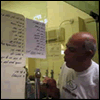As the devastating wildfires that have ravaged Fort McMurray in Alberta, Canada, for a week now continue to spread, Chabad-Lubavitch emissaries and volunteers have been assisting families in shelters, keeping in contact with Jewish residents and pledging their help in what is sure to be a long road to recovery.
The city’s population of approximately 90,000 has been evacuated, and the region—known for its oil industry—is currently under a state of emergency.
Rabbi Menachem and Rochel Leah Matusof, who direct Chabad Lubavitch of Alberta, Canada, have been reaching out to Jewish residents in the vicinity.
“Though there is no established Jewish community in Fort McMurray, we are working to contact everyone on our database—either by phone, email or in person, when possible—and through Facebook and other forms of social media to help anyone who needs it,” says Rabbi Matusof, who is located in Calgary, in the southern part of the province of Alberta, about 770 kilometers (nearly 480 miles) from the fires in the north. “There has been an outpouring of concern and support for the entire community there. So far, most of our contacts have confirmed their safety.”

More concretely, they are trying to find an apartment for a family that fled to Calgary, and have offered assistance to volunteers from the Canadian Jewish Federation and the Israeli humanitarian-aid charity IsraAID, now on the ground in Fort McMurray.
Closer to the fires, Chabad-Lubavitch emissaries in Edmonton—including Rabbi Ari and Rifka Drelich, and Rabbi Mendy and Chaya Sarah Blachman—have visited the Edmonton EXPO Centre at Northlands, where evacuees have been passing through since leaving their homes. They are bringing kosher food to Albertans there, and helping a family with young children obtain furniture and a bassinet.
Over the years, young rabbinical students have traveled to Fort McMurray to connect with the 50 or so Jewish residents there.
Mezuzahs to Be Provided
Blachman notes that he helped one evacuated family reconnect with their Jewish roots. After he brought dinner to a shelter in Edmonton, a woman and her sister expressed their gratitude in a text to the rabbi that read: “Thank you! We ate the delicious lasagna and salad so loving of your wife to make for us. This text is to thank you for the nice gestures. I [say] the prayer you have [given] to us every day. It feels good.”
While Chabad centers in Canada are striving to do what they can, much of the real work, they note, as with most calamities of this type, will be associated with recovery and rebuilding.
The fire, which is moving towards Saskatchewan to the east due to high winds and dry weather conditions, is being declared one of the worst disasters in the country’s history and the costliest, with billions in damages. More than 2,000 homes and other buildings have been burned, and it could take months to put out all of the hot spots for good.

“We won’t forget about the fire, even when the world has moved on to something else,” says Matusof. “We will still offer assistance and support in its aftermath, when people truly feel the effects of what they’ve lost, including providing mezuzahs for all Jewish homes and businesses in the area.”
He thanks the many individuals and organizations in Calgary and Edmonton for their outpouring of support and care, including people opening up their homes, and donating furniture and clothing. Among them is Akiva Academy in Calgary for accommodating three children into the school for the duration of their stay there.
Chabad centers in this part of Canada encourage feedback on other families in need. They have also started an online drive to support outreach and relief efforts to families and individuals in need; learn more by clicking here.







Start a Discussion